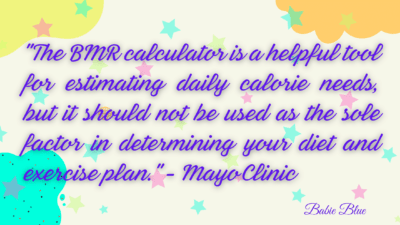
Transform Your Body with BMR Calculator: How to Use It to Reach Your Goals
Table of Contents
Introduction
Are you tired of guessing how many calories you should consume to achieve your weight loss goals? Do you want to know the exact number of calories your body needs to function properly? Look no further than the BMR calculator. Your basal metabolic rate (BMR) is the number of calories your body burns at rest. It's the amount of energy your body needs to maintain its essential functions, such as breathing, circulation, and digestion. In this article, we'll explain what a BMR calculator is, how to use it, and what factors affect your BMR.
What is a BMR Calculator?
A BMR calculator is an online tool that estimates the number of calories your body burns at rest. It uses your age, sex, weight, and height to calculate your BMR. Once you know your BMR, you can use it to determine your daily calorie needs, which can help you lose weight or maintain your current weight.
How to Calculate Your BMR?
To calculate your BMR, you can use a BMR calculator. All you need to do is input your age, sex, weight, and height into the calculator. The calculator will then estimate the number of calories your body burns at rest.

Factors Affecting Your BMR
Several factors can affect your BMR, including:
- Age: As you age, your BMR decreases because your body loses muscle mass and your metabolism slows down.
- Sex: Men usually have a higher BMR than women because they have more muscle mass.
- Weight: The more you weigh, the higher your BMR because your body needs more energy to maintain its functions.
- Height: Taller people have a higher BMR because they have more surface area and need more energy to maintain their body temperature.
- Body composition: People with more muscle mass have a higher BMR because muscle burns more calories than fat.
How to Use Your BMR to Achieve Your Weight Loss Goals
Once you know your BMR, you can use it to determine your daily calorie needs. To lose weight, you need to consume fewer calories than your body burns. For example, if your BMR is 1,500 calories per day, and you want to lose one pound per week, you need to create a calorie deficit of 3,500 calories per week or 500 calories per day. This means you should consume 1,000 calories per day to create a deficit of 500 calories.
Tips and facts related to BMR Calculator
- Exercise can increase your BMR: Regular physical activity can help increase your muscle mass, which in turn can increase your BMR. Aim for at least 150 minutes of moderate-intensity aerobic exercise per week, along with strength training exercises two or more times per week.
- Crash dieting can decrease your BMR: Severely restricting your calorie intake can cause your body to go into "starvation mode" and lower your BMR, making it harder to lose weight in the long run.
- Sleep can affect your BMR: Lack of sleep can disrupt your metabolism and decrease your BMR, so aim for 7-8 hours of sleep per night.
- Age-related BMR changes: As you age, your BMR decreases by around 1-2% per decade. To counteract this, try to stay active and maintain a healthy diet as you get older.
- BMR is not the same as TDEE: Your total daily energy expenditure (TDEE) includes your BMR as well as any calories burned through physical activity. To calculate your TDEE, you'll need to factor in your activity level in addition to your BMR.
- Factors that can increase BMR: Some factors that can increase your BMR include drinking caffeine, exposure to cold temperatures, and eating spicy foods.
- BMR calculators are estimates: While BMR calculators can give you a good estimate of your calorie needs, they may not be 100% accurate. Factors like genetics, medical conditions, and hormonal imbalances can affect your BMR.
- BMR is different for men and women: Men tend to have a higher BMR than women due to differences in body composition. Men typically have more muscle mass, which burns more calories at rest than fat tissue.
- BMR can be influenced by genetics: Some people may have a naturally higher or lower BMR due to genetic factors. However, lifestyle habits like exercise and diet can still have a significant impact on overall metabolism.
- BMR can be affected by medical conditions: Certain medical conditions like hypothyroidism and Cushing's syndrome can cause a decrease in BMR. If you suspect you have an underlying medical condition that is affecting your metabolism, it's important to talk to your healthcare provider.
- BMR is just one piece of the weight loss puzzle: While understanding your BMR is important for weight loss, it's just one factor to consider. Other important factors include the types and amounts of food you eat, your level of physical activity, and your overall lifestyle habits.
- BMR can change over time: Your BMR can change over time due to factors like weight loss, muscle gain, and aging. It's important to recalculate your BMR periodically to ensure that you are adjusting your calorie intake accordingly.
- BMR calculators can be found online: There are many online BMR calculators available for free that can give you a rough estimate of your calorie needs. However, it's important to remember that these calculators are just estimates and may not be 100% accurate.
- BMR is affected by body composition: Your BMR is influenced by your body composition, which is the ratio of muscle mass to fat mass in your body. Generally, people with a higher proportion of muscle mass tend to have a higher BMR, as muscle tissue burns more calories at rest than fat tissue.
- Age and BMR: As mentioned earlier, your BMR decreases with age. This is partly due to the natural loss of muscle mass that occurs as you age. To counteract this, it's important to engage in regular exercise and strength training to maintain muscle mass.
- BMR can be influenced by hormones: Hormonal imbalances can affect your BMR. For example, low levels of thyroid hormone can cause a decrease in BMR, while high levels of cortisol (the "stress hormone") can also lower BMR.
- BMR can vary from day to day: Your BMR can fluctuate slightly from day to day depending on factors like your level of physical activity, sleep quality, and even the temperature of your environment.
- BMR and weight loss: To lose weight, you need to create a calorie deficit by consuming fewer calories than your body burns each day. Your BMR can help you determine your baseline calorie needs, but it's important to remember that weight loss also requires a healthy diet and regular exercise.
- BMR is affected by dieting: When you go on a low-calorie diet, your BMR can decrease as your body tries to conserve energy. This is why it's important to be careful when restricting calories and to make sure you're still consuming enough nutrients to support your body's needs.

By understanding how BMR works and the various factors that can affect it, you can make informed decisions about your diet and exercise routine to support your overall health and weight loss goals.
FAQ's
What is the BMR calculator?
The BMR calculator is a tool that calculates your basal metabolic rate, which is the amount of energy your body needs to perform basic bodily functions at rest. The BMR calculator takes into account factors such as your age, gender, weight, and height to provide an estimate of your daily calorie needs.
How accurate is the BMR calculator?
The BMR calculator provides a rough estimate of your daily calorie needs, but it is not 100% accurate. Factors such as body composition, hormones, and lifestyle habits can all affect your actual calorie needs. However, the BMR calculator can be a useful starting point for determining your baseline calorie needs.
What factors influence your BMR?
Your BMR is influenced by a variety of factors, including your age, gender, weight, height, body composition, hormones, and lifestyle habits. Generally, people with a higher proportion of muscle mass tend to have a higher BMR, as muscle tissue burns more calories at rest than fat tissue.
Can you increase your BMR?
Yes, you can increase your BMR through regular exercise and strength training, which can help build muscle mass. Eating a balanced diet with plenty of protein can also support muscle growth and increase your BMR. However, keep in mind that your BMR will naturally decrease as you age, so it's important to continue exercising and strength training to maintain muscle mass.
How can the BMR calculator help with weight loss?
The BMR calculator can help you determine your baseline calorie needs, which can be used to create a calorie deficit for weight loss. By consuming fewer calories than your body burns each day, you can create a calorie deficit that can lead to weight loss over time.
Is it safe to rely solely on the BMR calculator for weight loss?
No, it is not safe to rely solely on the BMR calculator for weight loss. While the BMR calculator can provide a rough estimate of your daily calorie needs, it is important to consult with a healthcare professional to determine a safe and effective weight loss plan that meets your individual needs and goals.
How often should you recalculate your BMR?
Your BMR can change over time due to factors such as aging, weight loss or gain, and changes in muscle mass. It is recommended to recalculate your BMR every 6-12 months or whenever there are significant changes in your body composition or weight.
Can the BMR calculator be used to determine muscle mass?
No, the BMR calculator does not directly measure muscle mass. However, it can indirectly estimate muscle mass based on factors such as weight, height, and gender. People with a higher proportion of muscle mass tend to have a higher BMR, as muscle tissue burns more calories at rest than fat tissue.
Are there any limitations to the BMR calculator?
Yes, there are some limitations to the BMR calculator. It is a rough estimate of your daily calorie needs and does not take into account factors such as genetics, medical conditions, and medication use that can affect your BMR. Additionally, the BMR calculator does not account for the thermic effect of food, which is the energy required to digest and process food.
What is the difference between BMR and TDEE?
BMR (basal metabolic rate) is the amount of energy your body needs to perform basic bodily functions at rest, while TDEE (total daily energy expenditure) is the total amount of energy your body needs to function throughout the day, including physical activity and exercise. TDEE takes into account factors such as your BMR, physical activity level, and the thermic effect of food.
In conclusion
Your basal metabolic rate (BMR) is the amount of energy your body needs to perform basic bodily functions at rest. Understanding your BMR can help you determine your baseline calorie needs and create a plan for weight loss or weight maintenance. By incorporating regular exercise and strength training, maintaining a healthy diet, and paying attention to factors that can affect your BMR, you can support your overall health and wellness. Remember to use BMR calculators as a tool, but also consult with your healthcare provider to ensure you are meeting your specific nutrient and calorie needs. With the right knowledge and tools, you can achieve your health and fitness goals while feeling energized and healthy.